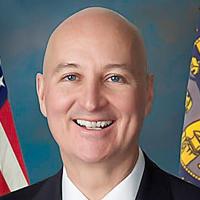The on-again and off-again tariffs that President Donald Trump has been imposing and then rescinding on other countries has created uncertainty in agricultural markets worldwide and is affecting ag pricing along with other impacts to agricultural stability in Nebraska and across the U.S.
During his weekly conference call with Nebraska reporters, U.S. Sen. Pete Ricketts threw his support behind President Trump’s approach to leveling the trade playing field through the use and or threat of tariffs on other nations as an effective bargaining tool. Ricketts pointed to the recent agreement with the United Kingdom as an example of the success of the president’s strategy.
“We want to level the playing field level, which is what the president is doing,” Ricketts said.
“And for example look at the deal we got with the U.K. as an example of getting a better deal for Nebraska agriculture. For example, the U.K. has raised its 0% tariff threshold for beef from 1,000 metric tons to 13,000 metric tons and has agreed to buy $700 million of U.S. ethanol.”
Ricketts also talked about the ongoing trade and tariff disputes between the United States and the rest of the world and called them an overdue effort to get fair trade for American goods and services, including Nebraska agricultural products.
Ricketts told reporters the Trump administration’s approach to fair trade is the correct approach.
“The rest of the world charges us four times the tariff rate that we charge the rest of the world,” Ricketts said.
“Part of what we need is to get leveled so that our companies and producers are on the same level playing field when we are trying to sell our products overseas and those folks are trying to sell their products into our country.”
Trump has announced that another round of tariff hikes will go into effect on Friday, Aug. 1, with other countries that have not yet negotiated a deal with the U.S.
Meanwhile, an ag economist said he’s concerned about continued tariff threats from the Trump administration.
During an interview with the Brownfield Agricultural Network, Ernie Goss with Creighton University said the July Rural Mainstreet Index, a monthly survey of rural bank CEOs, revealed that bankers expect higher tariffs to lower farm income.
“Four out of 10 said these tariffs have negative effects on the rural main-street economy,” he said. “That’s due to trading partners raising tariffs in response to our tariffs as well.”
He told Brownfield he’s hopeful the U.S. can stay on good terms with Mexico.
“Between 45% and 50% of agricultural products go to Mexico,” Goss said. “The president has threatened tariffs on Mexico of upwards of 30% to 40%. That would have some fairly significant impacts. It would be negative for this part of the country.”
Goss said data from the International Trade Association shows regional exports of ag goods and livestock for the first five months of 2025 were down nearly 15% year-over-year.
